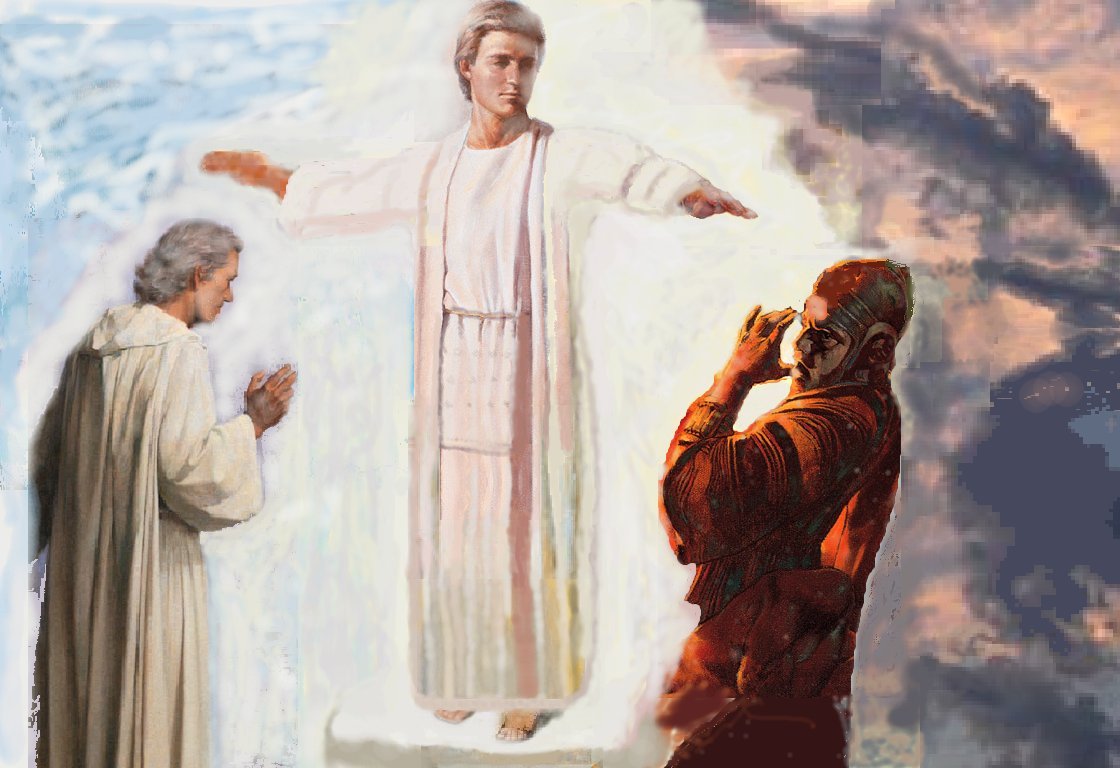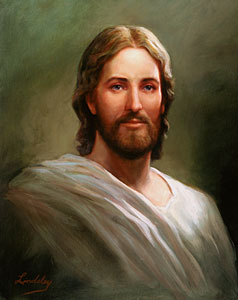
For example, the various compilers and translators of this text likely only had the immediate high priest 'Joshua' of the Jews, the son of Josedech, to whom they have presumed this vision to be concerning. Thus their lack of perspective does not yield the fact that this vision was one of the preexistence, where Jehovah by the name of Jehoshua stood before the presence of the Father in a judgment council of heaven held to resolve the accusations of Lucifer, Satan, as he opposed Jehovah in the preexistence.
With the fuller understanding which modern revealed scripture yields concerning the preexistence, as well as further light and understanding to draw upon, Zechariah becomes one of the more unique texts in all of the Old Testament, for it does reference Jehovah by the name given him by the Father. That name being Jehoshua, which is the same as Jesus. Thus we have a case where 'Jesus' is mentioned by name, the name Jesus/Jehoshua in the Old Testament.

Zechariah Chapter 3A New Translation Fourth Vision of Zechariah - A Messianic Vision of the preexistent high council court where Jehovah as ‘Jehoshua’ and Lucifer as ‘Satan’ stood before the presence of the Father. Judgment was made rejecting Lucifer. Jehovah was proclaimed, His calling and mission set out, and that at the second coming the sins of the world are removed in one day. 1 AND the angel showed me Jehoshua, [that is Jehovah in whom is Salvation], the Great High Priest, standing before the presence of the angel of the FATHER-YHWH, and Satan [the accuser] standing at his right side to accuse him [Jehoshua]. 2 And FATHER-YHWH said unto ‘the accuser’ [Satan] (who is Lucifer), I, the FATHER-YHWH rebukes against [rejects] thy accusations, O SATAN [the accuser], even the FATHER-YHWH who hath chosen the ‘Holy City of the Lord’, the ‘City of Peace’ (an allusion to Jehovah and his followers), rebukes thee: this is a branding iron of fire upon thee, [O SATAN]!? (Wherefore his name became the ‘accuser’ or 'Satan' as 'branded' upon him by God.) 3 Now Jehoshua [Jesus meaning Jehovah Salvation] wore upon himself the vestige of the sins of all, and stood before the presence of FATHER-YHWH. 4 And FATHER-YHWH spoke to those standing before him, saying, Remove the vestige of sins from off him. And unto him (whom He called Yehoshua [Jehovah in whom is Salvation]), he said, Behold, I will cause these sins to be removed from thee, and I will clothe thee in a change of glorious priestly robes [temple attire]. 5 And I [FATHER-YHWH] said, Let them set a diadem [priestly turban/hat] of purity upon his head. So they set the priestly hat of purity upon his head, and dressed him with radiant [glorious priestly/temple] raiment. As the angel of the FATHER-YHWH stood by. 6 Then the angel of the presence of FATHER-YHWH testified/witnessed/promised or vowed/covenanted unto Yehoshua [Jesus], saying, 7 Thus saith the FATHER-YHWH of hosts [spirits of heaven], If thou wilt walk in my ways, and if thou wilt keep mine ordinance/covenant [the Gethsemane saving vicarious suffering], then thou shalt also judge My house, and also keep My courts, and I will give thee place to walk among these heavenly Gods that stand beside Me. 8 Hear now, O Yehoshua [Jesus - Jehovah in whom is Salvation] the great high priest, thou and thy followers who sit before thee: for they are men wondered of [peculiar] or a wondrous sign of things to come: For Behold, I will bring thee forth, my servant the BRANCH. 9 For behold the stone/jewel I have laid before the face of Yehoshua [Jesus]; upon this single stone shall be seven facets/eyes: behold, I will engrave the inscription thereof, saith the FATHER-YHWH of hosts, and I will remove the sins of the world in a single day. 10 In that day, saith the FATHER-YHWH of hosts, shall ye call every man thy neighbor under the vine and under the fig tree. (See Micah 4:3-4)
 Jehoshua = Joshua = Jesus Jehoshua - Jehovah Deliver/Savior in the Old Testament |
Commentary NotesNote 1. Satan does not appear before God’s councils in heaven after he has been cast out of heaven and down to the earth. Satan being cast out occurred in the preexistent wars in heaven prior to any of Earth’s history. Thus logic supports that this appearance of Satan and Jesus (Jehoshua) before God’s judgment council occurred prior to Satan being cast out of heaven and is not part of later earth history.
Note 2. In the Hebrew Bible the more proper and formalized form of the name Joshua is used, which is Jehoshua or Yehoshua. This name literally means ‘Jehovah Saves or Delivers’ and is stated to mean ‘Jehovah is Salvation’. Note 3. Joshua, that is Jehoshua, is the same name as Jesus. Jesus being the Greek equivalent of Joshua via Latin and the transliteration into the KJB English Jesus. Thus Zechariah, if translated via that route, would be using the name ‘Jesus’ every time the name Joshua appears in our KJB. This is Jesus by name in the Old Testament. Note 4. In the Jewish prepared Old Testament, the name 'Elohiym' is the plural form meaning 'Gods' (Eloh=God & iym=s) and it can be taken to mean both, or either one or the other, as the Son does act for and in the stead of the Father in all things. Thus often in Jewish compilation, the names of Jehovah, which can and is also a name shared jointly by the Father and Son, and Elohim are found to be used interchangeably, and they can have reference to the ‘Father’ meaning God the Father of Spirits and/or Jehovah the Son of God, as we know each of them to be. In short, though we distinguish the Father as Elohim and the Son as Jehovah, the Jewish editors and compilers of the Old Testament did not. They use both words interchangeably and perhaps just as often implying both working in unison togther as the 'gods' as the Book of Abraham chapter 4 account of the creation shows that the 'elohiym' used in the Hebrew Bible is much better translated to be 'Gods' in recording that 'the Gods' did perform the creation in unison. Note 5. Since the Jewish prepared Old Testament was not compiled or prepared until after the Babylonian captivity as commanded Jeremiah, many of the words of Moses have been edited out and later Jewish ‘clarifying’ commentary from a strictly Jewish held perspective have been added to the Bible text. For example, Moses, who lived in Egypt and never saw the promised land had only God’s and perhaps Abraham’s and other’s writings to base his record. From Jacob’s knowledge and therefore Moses’ knowledge the place called Ephrath would not have been known as Bethlehem, as Bethlehem is a much later given name. Thus the comments that Ephrath is the same as Bethlehem are Jewish added commentary of clarification and are strictly from purely the Jewish perspective which existed after 600 BC. Thus the Old Testament text is not purely the words of the prophets, but edited text from the Jewish perspective. Note 6. Since the Scriptures have been edited and commented upon from strictly a Jewish perspective, this author feels that it is no big jump to do likewise and restate them according to a latter-day perspective, which has added scripture and revelation upon which to draw upon and not just Jewish tradition and similiar supposition, which has molded today’s interpretations of the Bible. Note 7. It is God the Father who names Jehovah, Jesus or Jehoshua. This fact is stated in Pilippians 2:9-11. “Wherefore God [the Father] also hath highly exalted him, and given him a name which is above every name: That at the name of Jesus [JEHOSHUA] every knee should bow, of things in heaven, and things in earth, and things under the earth; And that every tongue should confess that Jesus Christ [JEHOSHUA the Anointed] is Lord, to the glory of God the Father.” The Father anointed Jehovah as the Savior in the preexistence when Jehovah was ordained as man’s sole source of salvation. Zechariah chapter 3 confirms that it was in conjunction with that calling and anointing is when the Father so named his son Jehoshua. Note 8. In verse one, though the Hebrew-English Bible yields 'priest high', the more literal translation may not equate exactly to ‘high priest’ but to a ‘priest who is grand or great’. Thus the inference is much more than just a Levite priest, implying more appropriately the Great High Priest we know as Jehovah. Note 9. In Hebrew the word Satan is ‘accuser’, that is being adverse to or adversary of. Lucifer's name was changed to Satan as he slandered, opposed and accused Jehovah becoming the adversary of both the Father and the Son. Note 10. The Hebrew for the ‘change of clothes’ is better
rendered as resplendent garments or
raiment. Since Yehoshua was the Great
High Priest it is logical and has been translated by others that these were
not just street clothes but the ‘priestly robes worn to officiate in the temple’. Note 11. A ‘mitre’ is a hat or cap in simplest terms and in respect to the ‘temple outfit’ it would the hat worn in the temple by one dressed in the temple robes. Note 12. It is better Hebrew to have stated ‘clean or pure’ mitre rather than just ‘fair’ mitre. Note 13. What was translated as ‘protest’ in the KJB is better translated as ‘witness’ in terms of giving a ‘promise’ of ‘testimony’ respecting more of a ‘covenant’ being sworn to. Note 14. Jerusalem is known as the ‘city of peace’, ‘holy city’, ‘God’s city’, the city of the Great King meaning Jehovah or Jesus Christ (Isaiah 1:26; Isaiah 48:2; 1 Nephi 20:2; Isaiah 52:1; Jeremiah 3:17; Joel 3:17; Matthew 5:35; Revelation 11:2; Hebrews 11:10) and has allusion to the ‘people of the Lord’, meaning those who are ‘holy’ and of Jehovah. The Jews may have used the name Jerusalem for the ‘holy city’ of the Lord, which from their perspective was ‘Jerusalem’. In context of Zechariah’s vision, it seems more accurate to leave it as the ‘city of peace’ or ‘holy city’ (Moses 7:62), which relates Jehovah and his people being accept and Satan being rejected. Note 15. Now as part of the Plan of Salvation, Jesus was to take upon himself all the filthy sins of the world. Whether this had anything to do with Lucifer’s deceptive accusations against Jehovah in the preexistence, at least before the Father during the ‘trial council hearing’ Jehoshua was pictured as having this vestige of filthy garments upon him, which the Father removed from him as part of the council’s decision. Note 16. The 'stone' (jasper/jewel) (Rev. 4; 21:11,19) laid before Jehovah, here named Jehoshua [Jesus], is that very Gospel (D&C 11:24), Plan of Salvation, just spoken of in number 15 which is to roll forth unto all the world (Dan. 2:34, 45; D&C 65:2) . And the seven facets of eyes set upon it are the seven servants of God, the heads of the seven dispensations of time from Adam to Joseph Smith, seers of God (JST Rev. 4:5; Rev. 5:6; JST Rev. 5:6; Rev. 8:2; Rev. 15:1; D&C 77:12). Note 17. By the power of the atonement, God has prepared the way for the sins of the world to be removes and in the day of the Lord they will be removed from the world in a single day. Note 18. The vine and fig tree reference is clearly to the Millennial Day of the Lord of the peace and happiness without care which is further established by Micah 4:3-4. |